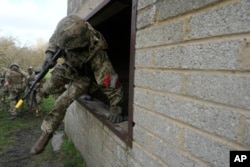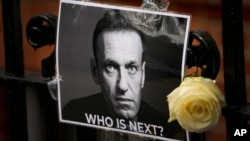Ukraine marks the second anniversary of Russia’s full-scale invasion on Saturday as Kyiv urges its Western allies to continue to provide the military aid it relies on to defend itself.
Ukrainian President Volodymyr Zelenskyy said in his daily video message Friday evening that a U.S. aid package, which has stalled in the U.S. Congress, is “fundamental to our defense both in terms of its contents and the message it sends to the world.”
U.S. Senate Majority Leader Chuck Schumer, who is visiting Ukraine, urged House members to “do the right thing” and pass the Ukraine military aid bill.
Schumer, along with four other Democratic senators, held talks with Zelenskyy in the western Ukrainian city of Lviv on Friday.
“We have been told by President Zelenskyy, we have been told by American and Ukrainian officials … that without the aid Ukraine will lose the war,” Schumer said at a news conference.
The U.S. Senate passed a bill last week that included $60 billion in military aid for Ukraine. But Republican Speaker of the House Mike Johnson has not brought the measure up for a vote in the House.
Britain commits $311 million
In Britain, the Defense Ministry announced it will spend $311 million over the next year to boost Ukraine’s artillery ammunition.
“They cannot win this fight without the support of the international community — and that’s why we continue to do what it takes to ensure Ukraine can continue to fight towards victory,” British Defense Minister Grant Shapps said in a statement.
In Germany, Chancellor Olaf Scholz said Europe must increase its defense to prevent any attack from outside.
“Deterrence, defense readiness — I know these are unusual words coming from a German chancellor. Words that we in Germany have not used for so long that they have almost been forgotten,” Scholz said in a podcast.
“But these words stand for a very important task: together with our allies, we must be so strong that nobody dares to attack us.”
On the battlefront Friday, Ukraine’s military said it downed a Russian early warning and control aircraft. Russia has not confirmed the loss. If true, it would be the second such military aircraft downing in just over a month and would represent a significant victory for Ukraine.
US imposes new sanctions
Earlier Friday, the U.S. government imposed more than 500 new sanctions on Russian entities, in the single largest round of penalties since the war began.
The government said the sanctions mark both the second anniversary of the invasion and are a response to the death of Russian opposition leader Alexey Navalny at an Arctic prison.
“Russia’s economy and military-industrial base are showing clear signs of weakness in part due to the actions we, along with our partners and allies around the world, have taken to support Ukraine’s brave defense,” said Treasury Secretary Janet Yellen.
Yellen urged the House of Representatives to pass the Ukraine aid bill that has been cleared by the Senate and “to join our allies around the world in giving Ukraine the means to defend itself and its freedom against [Russian President Vladimir] Putin’s barbarous assault.”
U.S. Secretary of State Antony Blinken said the new U.S. sanctions against Russia will have a growing and lasting impact on Russia.
“All of the technology that’s being denied as a result of its actions will have an increasingly heavier and heavier impact,” Blinken said, responding to a question by VOA’s State Department Bureau Chief Nike Ching.
“The fact of course, that so many people have left Russia, more than a million, including many of the most educated involved in science and technology in production, that’s also going to have a profound impact,” Blinken added.
U.S. President Joe Biden noted the new sanctions will target individuals connected to Navalny’s imprisonment, as well as Russia’s financial sector.
“They will ensure Putin pays an even steeper price for his aggression abroad and repression at home,” he said.
However, Russia’s export-focused $2.2-trillion economy has proved more resilient — despite two years of unprecedented sanctions — than either Moscow or the West anticipated. Russia invaded neighboring Ukraine on February 24, 2022, and the war has seen tens of thousands killed and myriad cities destroyed.
Russian Ambassador to the United States Anatoly Antonov was quoted by the RIA news agency as saying, “the new illegitimate restrictions are yet another brazen and cynical attempt to interfere in the internal affairs of the Russian Federation,” adding that the “new round of U.S. sanctions is an attack on Russia’s core interests, but Moscow will keep protecting them.”
Additionally, Canada, in coordination with the U.S. and Britain, announced Friday it is imposing sanctions on 10 individuals and 153 entities in a bid to punish Russia for its invasion of Ukraine. Earlier this week, the European Union approved a 13th package of Ukraine-related sanctions against Russia, banning nearly 200 entities and individuals accused of helping Moscow procure weapons or of involvement in kidnapping Ukrainian children.
Navalny funeral
An ally of the late opposition leader Alexey Navalny said Navalny’s mother has received an ultimatum from Russian authorities to either agree to forgo a public funeral for her son or they will bury him immediately on prison grounds.
Ivan Zhdanov, Navalny’s close associate, said Lyudmila Navalnaya was given three hours to accept a proposal for a private funeral for her son, outside the public eye, in an effort to suppress any outpouring of sympathy for Putin’s nemesis before the March presidential election.
Navalny, Russia’s most well-known opposition politician, died unexpectedly at age 47 in an Arctic penal colony last Friday. His death spurred hundreds of Russians across the country to create and stream makeshift memorials with flowers and candles.
Russian authorities have rounded up and detained scores for this.
VOA’s State Department Bureau Chief Nike Ching contributed to this report. Some information for this story came from The Associated Press, Agence France-Presse and Reuters.


